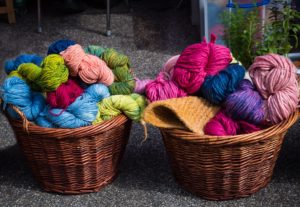(advertisement)
Calm The Mind With This Traditional Activity
Why doctors need to be promoting natural alternatives to managing depression, by recommending traditional hobbies such as knitting as a mood-booster.
The NHS spends £300 million per year on antidepressants for patients with a range of mental health conditions. While effective for many individuals, such treatment has known side-effects such as nausea, weight gain, loss of libido and constipation. Yet a more holistic approach to managing mental health issues has existed for centuries in the form of knitting. Here we take a look at the positive effects that knitting has on the mind, and why doctors should be prescribing it as a treatment.
 Abolishing Stress With A Knitting Needle
Abolishing Stress With A Knitting Needle
44% of us experience long-term stress, as revealed by an extensive BUPA study. Exercise, improved nutrition and practicing mindfulness are all ways touted by mental health professionals to eradicate stress and provide a mood-boost. But the benefits of knitting are often overlooked. This is a great shame, as they’re actually comparable to both yoga and mindfulness in terms of how they benefit the mind.
Deramore talks about mental health and the importance of calming the mind. The repetitive, rhythmic motion of knitting requires the brain to focus on nothing but the simple stitch. Carrying out the same action again and again allows the heart to rest and the breath to slow down. The knitter can focus only on the task at hand, and not worry about the past or the future, which is a similar approach to how mindfulness works. By connecting with your body in the present, this helps to quieten the mind.
(advertisement)
A survey of 3,500 knitters carried out by Cardiff University discovered that knitting regularly is key to enjoying better mental health. In fact, 81% of those surveyed felt calmer and happier both during and after knitting. A further 54% of those who were clinically depressed felt happy or even very happy when knitting.
 Knitting Provides Opportunities To Socialise
Knitting Provides Opportunities To Socialise
If you’re thinking that knitting is a solitary hobby, then you couldn’t be more mistaken. Since the turn of the millennium, knitting has become a trendy and incredibly sociable activity. Stitch and bitch groups have been set up anywhere and everywhere, whether located in your local pub, village hall or at a friend’s house. The act of getting together for some friendly conversation while enjoying a common pursuit, is a fantastic social opportunity. Some people with mental health problems can struggle with socialising, but isolation and loneliness are both contributing factors towards depression and even suicide, so attending a knitting group could be an important step in keeping socially active.
Creativity Important For The Mind
Everyone can access the benefits of knitting, whether you’re a beginner learning your first few stitches, or a seasoned professional. However, knitters at all levels will appreciate the boost to their self-esteem when they finish a project. A study published by the Journal of Positive Psychology found that the feelgood factor associated with ‘old-fashioned’ activities such as knitting could improve the mood of a person the following day. In particular. “Overall, these findings support the emerging emphasis on everyday creativity as a means of cultivating positive psychological functioning.”
It’s not just those with a diagnosis of depression or other mental health conditions that can benefit from knitting. In an age where we spend more time looking at screens than engaging in conversation with our friends and family, it’s important to find ways to relax and balance the mind. So, it’s time to pick up your needles and cast on!
(advertisement)



